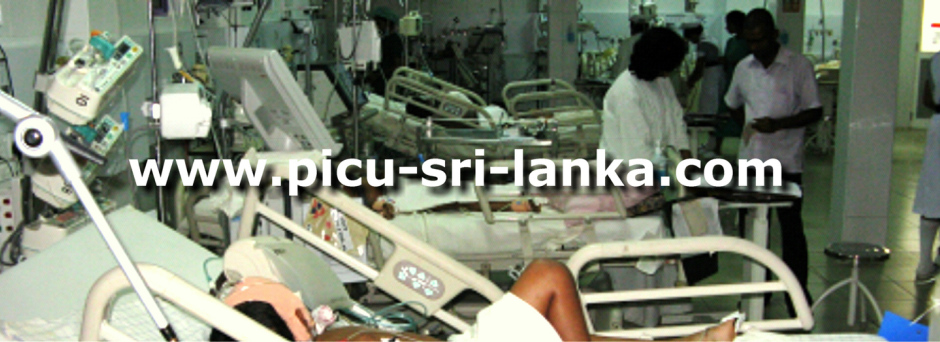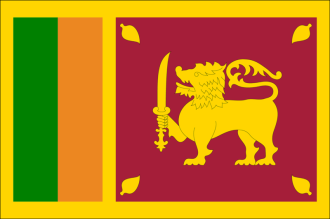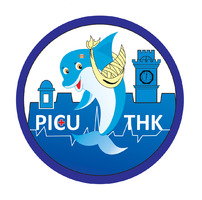Strategic Goals and Initiatives
The Initial Goal
Initially the goal was to help children who suffered from the Tsunami fast and soon, e.g. by supporting parents to rebuild their destroyed houses, to support the reconstruction of destroyed orphan homes or other shelters, and schools. Lions Clubs of Hannover Region came together and collected 40.000 € which were doubled by the SOLVAY GmbH.
This more generalist goal got focused when a call for help reach the Lions to build a one story small paediatric intensive care unit of 220 m2 within the existing Karapitiya Teaching Hospital in Galle, the regional capital in the Southwest of the country. The convincing argument was that it never ever should happen again that so many little children had to die only because locally no intensive care was available.
Funds were right enough to finance this idea. When the building was finished it became obvious that – due to the civil war in the country – the local authorities were unable to stay committed regarding the necessary medical technology. The Lions were asked to extend their help.
At the same time it happened that City of Hannover and SOLVAY were unable to realize their common project in the North of Sri Lanka, directly in the war zone, so that a potential 340.000 € might be used for the request from Karapitiya hospital.
After a most careful analysis it was found that max. 7 with the necessary technology well equipped intensive beds might be placed in the small Paediatric Intensive Care Unit (PICU), and that later an extension by a so-called Intermediate Care Unit (IMC) would be needed, room for patients who after intensive treatment might need long-term close care. Therefore it became obvious that the PICU building would need an extension on the first floor. Furthermore result was that the competence level of the staff needed to be built.
Eventually the decision - by the four stakeholders, the Lions, the City of Hannover,
SOLVAY GmbH, Medical School Hannover (MHH), to make the project real; but only with considerable further sponsorships of medical goods and further significant
fundraising.
Now the new goal was…
Construction and development of a PICU within Karapitiya Teaching Hospital (KTH) in Galle, Sri Lanka, in such a way that autonomously paediatric intensive treatment was possible; supporting KTH to run the PICU completely by its own.
The initiatives and the pathway to realization
The Lions nominated Prof. Wolf Dieter Gogoll as their project facilitator, the sponsors nominated Hartmuth Schulz. Similar roles on Sri Lankan side: Dr. Pushpa Punchihewa, Head of KTH’s Paediatrics, and Lion Nissanka Epaliyana, delegate of the Lions Club of Hikkaduwa.
Successful change - and there was definitively change necessary to realize this project - have to have always five components. If only one is missing change fails.
- If there is no pressure for change; without - as we call it -“Burning Platform” nothing will happen
- Leadership: For all people involved leaders need to set targets, communicate them so that people involved agree, and control them
- All steps - first ones and further ones – must be makeable
- Qualification and competence must be available or must been built so that “the new” becomes manageable.
- It has to be taken care that there are incentives; i.e. incentives which people subjectively estimate as incentives.
The project facilitators try to do their best to stay along with these rules or maxims; sometimes it was and still is not trivial because change shall happen in a cultural setting, Sri Lanka, which is definitively different from what the German colleagues are accustomed to, and vice versa. In order to overcome these barriers virtual and real meetings and communication are performed as often as possible.
Which success drivers do we have?
- Great medical expertise in order to define PICU’s future architecture, processes, technology, and learnings together with the necessary training. Medical School Hannover, MHH, nominated an internationally experienced team manager, PD Dr. Kathrin Seidemann, together with a senior physician in paediatric intensive care, Dr. Thomas Jack. Their team consists now of five - three nurses ivolved– all of them professionals in paediatric intensive medicine. Since 2007 they are working on making the fostership contract between the two hospital units a success story.
- Deliver up to available PICU staff competence level: Early idea brought in by the MHH team was to build up only that much medical technology what the local staff was able to handle, the Sri Lankan peers should gain own experiences, giving them a chance to repair their own mistakes, and to intervene for longer period only on request.
- German speaking delegate, Lion Nissanka Epaliyana, being the linking pin in particular for the removal of the thousands tiny obstacles and mastering the challenges caused by the transfer of the sometimes strange strategic initiatives from Germany.
- Safe payment process: The trustful management of the payment processes by the Lions Club of Hikkaduwa and Lion Nissanka: The medical technology is ordered by the Sri Lankan Lions after having been checked by MHH. The purchasing process is totally in Nissanka’s hands: ordering products and services, hand over to the PICU, and payment to the suppliers, checked by the Lions Club. By this it is secured that the money reaches the place were it should be. All project members are proud that 100% of what was sponsored reached the places where it should have been.
- Local procurement: What ever possible is purchased locally
- Local excellence in general paediatrics being the basis for development of intensivist competences to the required level. The Sri Lankan university system is very good, together with the mandatory consultancy phase over a period of 1 ½ to 2 years in an English speaking country, additionally there are the teaching phases by MHH staff locally and in Hannover.
- Common trust among all stakeholders, namely the local and national health authorities around the Ministry of Health, the Faculty of Medicine, the media, the Lions on both sides, the KTH management, the MHH, specifically the PICU of MHH, last-but-not-least the sponsors, and the operative team as mentioned before.
- Strong sponsors who stayed with the project now over years and who promised to stay so far as they can.
- Strong facilitation and management team on both sides
The next steps
Obviously we did it right up till now, due to the performance figures and the positive feedbacks, for example from the German Ambassador, the German Red Cross country coordinator, both very familiar over the years with the Sri Lankan reality. The period of time spent by the team from “Förderverein PICU” in Sri Lanka targeted to develop the PICU stakeholder community to a well functioning unit and find out what to do next seem to be extremely short considering those specific local conditions. At the end of the day the outcome regarding the strategy became clear:
Short-term strategic necessities for the “Lighthouse Project PICU”:
1. Recruitment and induction of newly hired personnel, their integration and training on-the-job so that they will be able to run PICU now at full capacity of 7 incentive beds on ground floor and 7 intermediate care beds on upper floor
2. Advanced training of all staff by MHH, predominantly focusing on process quality and consistency. The next larger training sequence is planned for May 2014 in Galle.
3. Procurement and installment of still missing medical-technology, e.g. respirator/ventilator, together with other medical equipment as for instance a mobile sonograph.
4. The PICU core process „Hygiene-Improvement Programme“, sponsored by a generous German will require ongoing efforts. Progress can be reported: Wall-mounted disinfection liquid bottles are installed, the liquid is available, sustainable use is on track. The new intensivist, Dr. Manjula, is running daily training sessions for all doctors and nurses. A new vacuum cleaner has been purchased, as well as text books for advanced training. Not to forget: PICU has got its own cleaning services!
5. In preparation is the delegation of a former employee of MHH in order to teach the staff in preventive maintenance of the valuable medical equipment and to support Dr. Manjula in hygiene management.
6. Review and control of the just started tele-medicine by the German and the Sri Lankan facilitators in order to secure that the so-called Jour Fixe once per week on basis of Skype will really take place.
7. Fundraising for local procurement of specific consumptive products and medicine being not part of the hospital budget
8. Reinforcement of the established Parent Society! When a child being managed at an Intensive Care Unit it is a very challenging experience to the family, it would be very important to have a system where parents can share their experiences.
9. Reinforcement of the Sri Lankan “PICU Charity Group” right in the foundation process.
Long-term strategic necessities for the “Lighthouse Project PICU
Put in a nut shell: Mobilizing all resources and fundraising.
In more detail:
Due to the experiences and assumptions of the “PICU Förderverein” and due to the hospital’s leading staff findings it is clear: The Sri Lankan health budget is by far too small to cover all necessary medical interventions. There has to be considered that the country is still one of the “developing countries”. And unfortunately parts of paediatric intensive treatment will fall under these restrictions. As the PICU Förderverein is seeing the demand for support on the basis of the above mentioned strategic necessities – there might be an overall investment gap of more or less 15.000,-€ per year. Smaller parts will be acquired by the PICU Galle and the hospital staff by own fundraising initiatives. Examples: Already today expensive paediatric drugs are sponsored by pharmaceutical companies; pharmaceutical industry sponsored the first PICU room renovation after three years of operations and as well the PICU entrance security system.
How to make that real?
All in all a heavy story which is lying in front of the PICU Förderverein...
1. The Lions Clubs of the Hannover Region who once initiated the project have decided to support the next development stage towards a „Lighthouse Project PICU“ financially and sustainably, in order to avoid that PICU once in a while would be the next “investment ruin”, and that the once demanded sustainability might be reached. The Lions District NH 111 decided that PICU Galle should be its third international district project.
2. Significant contributions will come from long-term faithful supporters and sponsors and via the internet platform of www.betterplace.org .
3. Predominantly on PICU Förderverein’s agenda … improved PR and winning further strong sponsors. Examples: Sri Lankan tea factory owners have been won for PICU support. Hartmuth and Wolf Dieter are walking around through the Lions Clubs for information regarding project progress. With one of the German drugstore chains (dm-Drogerien) a bet has been placed that we are unable to get 100 people in front of their shop singing nursery rhymes. If we succeed they will pay us 2.000.- €. Of course everything together with press and media.
4. We are on our way to systematically scan those hospitals which will be shut down in order to find medical equipment for Sri Lanka.
The MHH team will be extended by further doctors and nurses. Together they will carry the training burden; the training sessions for Sri Lankans here in Hannover will be
continued. And furthermore they are initiating events for fundraising; they collect consumptive material which is not used anymore in MHH. Right now another container with various goods will be
packed. Those and equivalent initiatives will become the all day efforts.



